The EDGE Interview
If you are a regular reader of EDGE, you know that we go to great pains to craft every page of our editorial. That is especially true of our interviews. They are both topical and timeless. They are relaxed, thoughtful and well researched. They are as interesting for the interview well researched. They are as interesting for the interview subjects as they are for our readers. They are intimate conversations. Which answers the question we get all the time: Why would national celebrities agree to invest so much time and energy in a small regional magazine? We’ll let them speak for themselves…
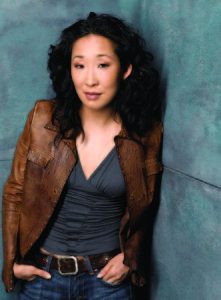
Bob D’Amico/Disney ABC Television Group/Getty Images
Sandra Oh
Actress
with J.M. Stewart
Is fame anything like you thought it was going to be?
No! Can I tell you? Honestly, it was probably one of the most traumatic events in my life. And, ultimately, I think it’s detrimental to being an artist. There’s a lot of struggle. If you want to be famous, awesome! But if you want to continue being an artist, I think fame is a hindrance. Your ability to be authentic is compromised. Fame is detrimental to one’s true artistry because that artistry comes out in the privacy of one’s being with one’s soul—when your soul feels safe in its surrounding to be free, to be authentic. Fame is a heavy, heavy cloak. In my case, I had a tremendous amount of struggle around that feeling of “threat.” There was a period of time when people would be sitting outside my house. How you manage that feeling of threat can go everywhere. It can go into your relationship, go into how you see yourself, and it can go into bad behavior because you start losing control over your privacy in your life. Yet no one’s pointing a gun at you. There’s no one actually “threatening” you. So, at the same time, you feel like your feelings are unjustified. I’ve thought about this a lot and I have no idea how people who are really famous are able to live and walk around, because they can’t just walk around. I feel that people—especially young people—cannot possibly comprehend the consequences of fame, of not being free. You have to manage your relationship with fame so you can continue to work and still be in the public eye. A lot of people can’t handle it and they leave.
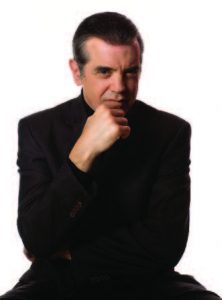
Photo courtesy of Chazz Palminteri
Chazz Palminteri
Actor
with Tracey Smith
Which parts of A Bronx Tale are autobiographical?
I would say a good 80 to 85 percent of the movie is autobiographical. It really stems from when I was nine years old sitting on the stoop and I saw this man kill another man right in front of me. Just like they did in the movie, exactly the same. My father came down and grabbed me upstairs, and then the cops came. The reality is I never went down and did a lineup. I just said I didn’t see anything, and that was it. Also befriending the wiseguys when I was a kid, throwing the dice for them, going to get things for them—that’s all true. Also my dad was a bus driver. He worked right off of 187th street. My mother used to be out the window all the time. I fell in love with a black girl at the age of 17. Some of the guys I knew died in a racial attack with some black youths. The majority is true.
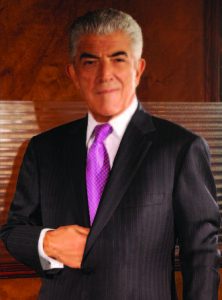 Frank Vincent
Frank Vincent
Actor
with Tracey Smith
You met Joe Pesci in 1969 when he became the guitar player in your band. How did that turn into featured roles in Raging Bull?
We had such chemistry. Not just playing. We’d do bits back and forth. I had a sort of Don Rickles thing going. The club entrance was right near the stage, so as people walked in off the street I’d always have something to say. We both got a lot of laughs and before you know it, we’re doing two hours of comedy a night. A couple of years later, this movie producer is in the audience and likes what we’re doing. He asked us both to audition for a low-budget movie called The Death Collector. Later they changed the name to Family Enforcer and put our faces on the cover. Joe played a little mob guy and I played a Jewish businessman. Bob DeNiro and Martin Scorcese saw that film and hired Joe to play Joey La Motta and me to play Salvy in Raging Bull. That was our first studio movie. I got my SAG card and an agent, and Joe got nominated for an Oscar…that was how it began.
 Lisa Kudrow
Lisa Kudrow
Actress
with Gerry Strauss
How did you develop the character of Phoebe in Friends?
The great thing I remember about Phoebe was that the audition piece was this monologue in the pilot that gives her whole back-story. My take on that really was to give a lot of definition to this person, that she’s cheerful about—or just refusing to see—the horrible, traumatic things that happened in her life. Her mom killed herself and then her stepfather went to jail, and she lived in a car, and she thought that was okay. That’s who she was going to be. Just this person who didn’t acknowledge reality the same way everybody else did.
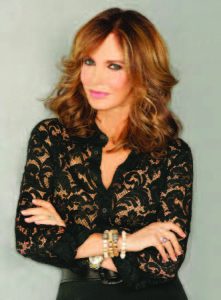
Jaclyn Smith
Actress
with Zack Burgess
Charlie’s Angels was a unique, unproven concept in its time. Did you sense it would make stars out of its three leads?
Absolutely not. And I think that’s what made it a hit. We went into it with an open mind. We were friends. We were not desperate, ambitious actresses. We all had proper training, so we explored that first year and really learned what was going to make the show work as time went on. I don’t think any of us thought that it would change our lives. We were surprised—and I think even the producers were shocked—at our ratings. Our ratings went through the roof. We were almost always number one, number two…really up there in the top five. We even beat Gone With the Wind one night!That was kind of amazing—my favorite movie of all time. It was sort of like we were rock stars, only overnight. We had no concept of the impact Charlie’s Angels would have.
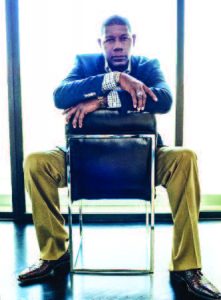
Photo by David Walden
Dennis Haysbert
Actor
with Tracey Smith
What kind of response did you get to your performance in Far From Heaven?
I can’t tell you how many women in their sixties came up to me with tears in their eyes and whispered to me, “That was my life”…and how my jaw dropped to the floor. Imagine in a time when you weren’t allowed to love someone because of the color of their skin, or their religion, or their gender—to have that permeate everything that you do, say or feel—and you still try to love that person? Let’s put it this way, there have been a few ladies that have been like the wonderful Julianne Moore played in my life, but there were some that my heart was attached to, and their hearts were attached to me, yet somehow it just didn’t work. I’m in contact with an old high-school girlfriend of mine. We had broken up and I had no idea why we broke up, none whatsoever, and I was so heartbroken. And now, when I’m in my fifties, she says, “I loved you, too. But the circumstances were that I couldn’t do it, because I was afraid for you.” I never even thought of myself being in any danger because I loved this person, yet she was wise enough at a young age of 16 or 17 to understand, “I have to let you go because you might get hurt.” That just took so much weight and energy off of me, a lot of pent-up pain and hurt that I could release after having that conversation. I also understand how rare it is that you get a chance to feel that.
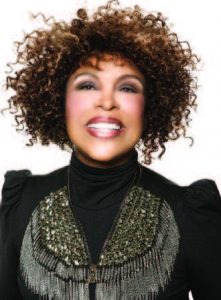
Photo by Brian T. Silak
Roberta Flack
Singer
with Tetiana Anderson
What do recall about your first #1 hit?
When “Killing Me Softly” was released as a single I was performing in Germany. My one source of English-language entertainment was the army base radio station. I had it on and woke up to Well, here it is again, Roberta Flack’s next big single, Killing Me Softly! I remember thinking, “Oh, boy!” But at the end they finished by repeating “…killing me softly with his song” over and over and then fading out. I said, “No, that’s not it!” I called the producer and asked, “What did you do?” He said, “Oh, I just faded it.” I said, “No! No!No!” He said, “Man, only like a million three hundred fifty thousand of these have been sent out all around the world. Can’t you live with that?” I said, “No.” So they changed it.
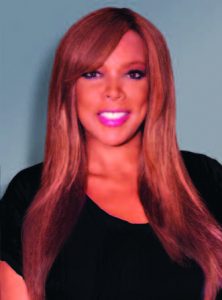 Wendy Williams
Wendy Williams
TV Personality
with Gerry Strauss
What makes a classic Jersey Girl?
Being gutsy. Playing fearless. If you squint, you might mistake her for a Long Island girl. She’s usually a little gaudy and a little bit—I don’t want to say “loud” because people think that’s unattractive—but since I’m talking to Jersey people, I would say she’s a little louder than the rest…and slightly tacky. The giant orange nails, teased up hairspray hair. That’s Jersey. There are so many jokes about Jersey being an armpit and all that other stuff… but so much good has come out of Jersey. How dare you! I’ve practically spent my entire career working in Manhattan but I’ve never lived there. Never had the desire. You know why? I love strip malls. I love traffic circles. I love drive-thru banks and drive-thru McDonald’s. I love parking spaces. I love Jersey Transit, not the subway. I don’t want to go down there—I’m not going down there! Our beaches may be not the cleanest beaches in the world, but they’re ours. I grew up on the Jersey Shore, and I never caught hepatitis from our water!I love Jersey.
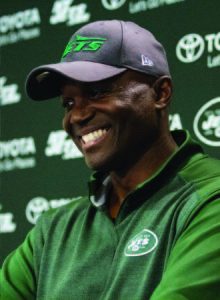
Courtesy of the New York Jets
Todd Bowles
Jets Coach
with Zack Burgess
In what ways do NFL teams function as families?
You have to learn to work together. You have to sacrifice and put all your egos to the side. You’re going to be in a building 8 to 16 hours a day, every day, with all these people—especially coaches, who work year ’round. For players it’s half the year. So you get to know these guys on a personal level and what makes them tick. They see what makes you tick. You kind of figure out what buttons to push; they figure out what they can and can’t do with you. There are a lot of personal relationships that go on behind the scenes that everybody doesn’t see. And you put out fires just like any other family. There are spats here and there, but for the most part we’re around each other so much, we kind of get a good feel for each other. And whether you like it or not, you’re going to be a part of a family. You have your bad people and good people—and everything in between. But at the end of the day, we have to be on one working relationship.
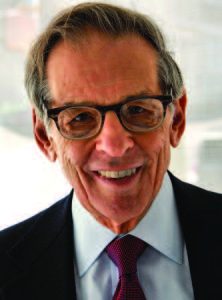
Photo by Larry D. Moore
Robert Caro
Author/Historian
with Jesse Caro
What spurred your interest in politics?
In the beginning, I liked trying to figure out how things worked, and wanted to explain that to people. When I first went to work for this little paper in New Jersey, I almost immediately narrowed that down to an interest in politics because, it seemed to me, that’s what matters. Almost immediately, I realized the idea of politics I had in college had very little to do with the way politics worked, and that I didn’t know how politics worked. Every day, I was learning something as a reporter. And since I felt like, if power in a democracy ultimately comes from us and the votes we cast, then the better informed people are about the realities of politics—not what we learned in textbooks in high school and college, but the way they really worked—the better informed our votes would be. And presumably the better our country would be. So I almost immediately started to be interested in politics for that reason.
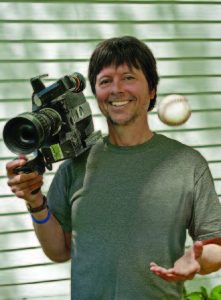
Photo courtesy of Al Karevy Photography
Ken Burns
Filmmaker
with Judith Trojan
Have you felt a special kinship with any of your subjects?
I feel a spectacular kinship with Louis Armstrong, Abraham Lincoln and Jackie Robinson; those three people are the bees’ knees for me. Now, would I compare myself to them?Never! I’ve had the great good fortune to spend a lot of time with them in the work that I do; and I feel that I’ve gotten to know them, even though they’re dead and I have not met them. I try my best to channel—if that’s the right word—the best of them to my fellow citizens to remind us of our greatest possibilities rather than our worst. These are the messages of love that Louis Armstrong gave us, of perseverance that Jackie Robinson displayed, and the wisdom and poetry that Abraham Lincoln exhibited. I’m proud to live in a country that had those three individuals as citizens.
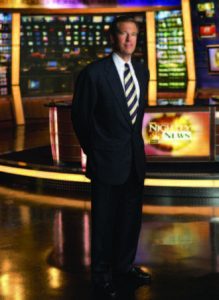 Brian Williams
Brian Williams
News Anchor
with Mark Stewart
How did you work your way to the top?
I didn’t have any contacts. I had no way in through the front door or the back. So climbing in the window of the television news business and coming up through the basement is the only way I know how to get ahead. That meant moving out to Kansas, learning the business, and being willing to crawl through broken glass to get ahead. If you have your eyes on a prize in this country, there’s nothing that can stop you—I’m a living example of that. I am not college educated, I did not grow up with honed skills or a family that knew what a prep school was. I didn’t know what the Ivy League was when I was in high school. It just wasn’t in my ken. But if you’re a hustler—and I’ve never regarded that as a pejorative, that word’s a positive in my book—the world is your oyster.
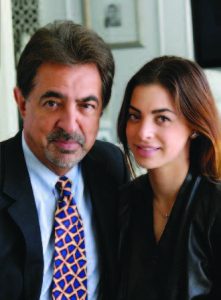
Photo courtesy of Danny Ramm
Joe & Gia Mantegna
with J.M. Stewart
What percentage of your father’s work have you seen?
Five percent. I’ve seen very little because most of it was released when I was too young to watch, or it was R rated. Half the films he dies in and I was too frightened to watch. I remember flipping through the channels watching a movie, and I saw my dad walking down the street with a bouquet of flowers. I went, “Yes! Dad’s on TV in something I can watch, this is so cool!” A couple of minutes pass and he’s shot down with a machine gun. It affected me much more than I thought it would. I remember seeing Baby’s Day Out when I was four. We thought, “Finally he did a movie that the family could watch.” We’re sitting on the bed, my sister’s right next to me, and here comes the scene when the baby’s in his pants, lighting his crotch on fire.
[Joe] Yeah, we’re thinking it’s a great family movie. But I get beaten up by gorillas and blown up. It was a horror film to them.
[Gia] It was awful. I remember running out of the room crying. And dad’s hitting his face, saying, “Look it’s me, I’m okay. I’m here.” So I never really sat down and watched my dad’s movies, because he was probably going to get the crap kicked out of him. EDGE
Editor’s Note: Go to our web site and click on the INTERVIEW tab to read the full Q&As.




